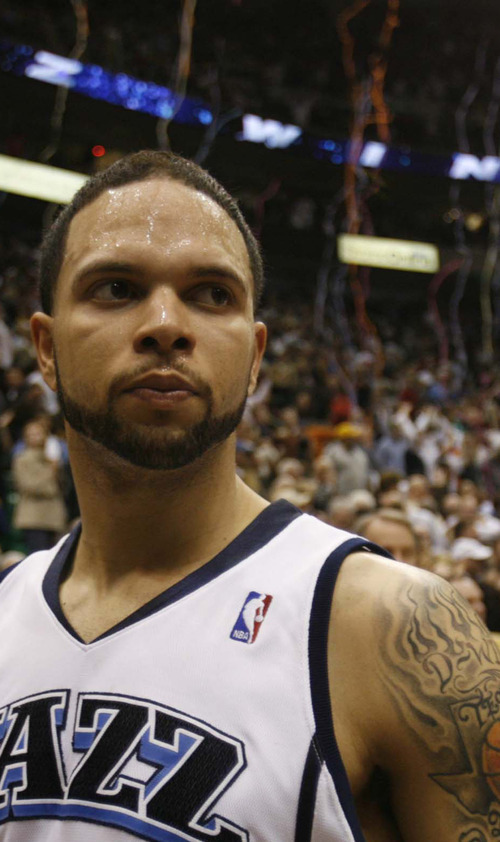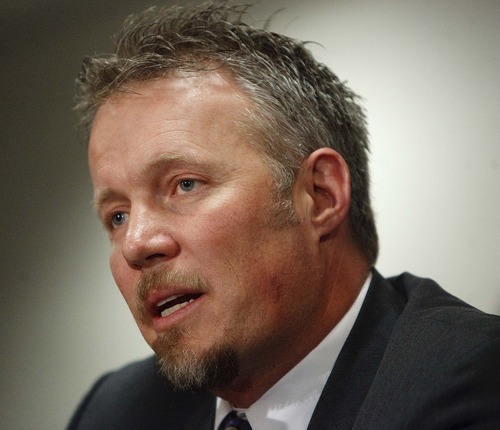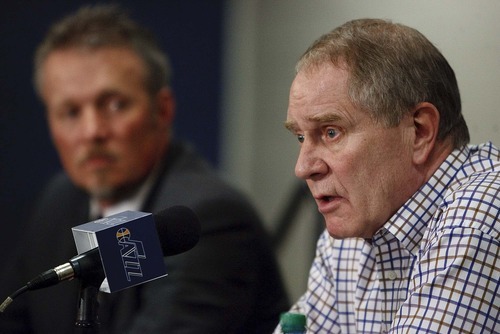This is an archived article that was published on sltrib.com in 2011, and information in the article may be outdated. It is provided only for personal research purposes and may not be reprinted.
Dallas • The Jazz have been run on two fronts all season.
One has been public, the other private. One has highlighted unity, inner strength and resiliency, the other has hinted at frustration, failure and division. And while the public push has spoken toward a win-now mentality that left many believing early during the 2010-11 campaign that Utah could do something special this year, a private fallout now threatens to undermine the Jazz's remaining 24 games — and perhaps beyond.
When Utah started training camp in late September, two things were absolutely certain: Jerry Sloan was the coach and Deron Williams was the star.
Now they're both gone. Sloan unexpectedly resigned Feb. 11. Williams was traded to the New Jersey Nets on Wednesday, the centerpiece of a shocking deal that will bring veteran point guard Devin Harris, rookie power forward Derrick Favors, two future first-round draft picks and$3 million in cash to Utah.
This didn't happen overnight. Behind the scenes, the Jazz's relationship with Williams had slowly been deteriorating after Carlos Boozer, Wesley Matthews and Kyle Korver left last summer via free agency.
Williams — the team leader and elected captain — clashed numerous times with Sloan, as the like-minded duo battled for control of the club. Granted, Williams never intended for Sloan to resign, and Sloan — who always acknowledged that the NBA was a "players' league" — has never publicly blamed Williams for his departure. But while Williams was gaining increasing control within the organization and still had 1 ½ already-hyped years remaining on his contract, the Jazz were going through their most significant transitional period since John Stockton and Karl Malone walked away. The team's locker room was united. But its widely respected coaches, star player and front office were not.
"It was something that was building the whole year," said longtime Jazz assistant coach Phil Johnson, who resigned in tandem with Sloan. "Jerry was frustrated and I was frustrated. … The truth is, it was just time for us to go.
"During the year," Johnson added, "Jerry would say to me, 'I don't know if I'm going to make it.' And I'd say, 'Let's go.' … We've never done that before."
Soon, Sloan and Johnson were gone. And just 12 days later, so was Williams.
The clearest sign that the two-time All-Star wasn't in Utah's long-term plans came last week, when Karl Malone'sfiery condemnation of Williams — highlighted by an assertion that inmates were running the asylum — was backed by a high-ranking Jazz executive.
Jazz General Manager Kevin O'Connor shot down lingering rumors that Williams' name had been floated to other teams during the past month — and that Sloan had been given a desperate "you stay and Williams goes" option during the hours leading up to his resignation.
But with the Jazz at a crossroads and the normally stable organization near the league leaders in turmoil, Utah decided to shake, and then break, its world apart Wednesday.
After watching Denver Nuggets superstar Carmelo Anthony fly away to New York Tuesday, the Jazz saw a sudden opening. Utah received about five offers for Williams. But it took just one good deal to send a shocked, saddened D-Will packing, instantly beginning a new era for the Jazz during a time of labor uncertainty and highlighted by a looming lockout.
"Nothing's forever and nothing's guaranteed," O'Connor said.
That didn't lessen the shock for the Jazz upon hearing the news of the trade Wednesday morning.
"It's been a whirlwind," said Jazz coach Tyrone Corbin, prior to Utah's 118-99 loss to the Dallas Mavericks at American Airlines Arena.
He added: "But that's this business, man. I played in it a long time. I've seen some crazy things happen. … If you're not ready for this, then you're not ready to be in the business."
And beyond the crumbling personal relationships, business played a major part in Utah's unexpected decision to trade the face of its franchise. Simply, the small-market Jazz feared they would lose Williams to free agency following the 2011-12 season and receive nothing tangible in return.
So O'Connor and Jazz Chief Executive Officer Greg Miller became proactive, factoring everything — from Williams' reluctance to commit to a long-term career in Utah to the increasing sway that superpower, major-market franchises hold over star players — into the decision to deal D-Will.
LeBron James left Cleveland suffering and helpless last summer after bolting for Miami, while Anthony drowned Denver in a six-month media storm before being traded to New York. The small-business-like Jazz weren't going to sit around and wait for a slow, humiliating death.
"It would be great to have him finish his career in a Jazz uniform, and I just didn't get the impression that his heart was in it," Miller said during a news conference at EnergySolutions Arena.
But why trade Williams now, when his career has yet to peak and he is producing all-time statistical numbers? And why not embark on a leaguewide hunt to find the best deal possible, rather than cash in on the Nets' Plan B after Anthony went to the Big Apple?
"Do you think they would even trade [Williams]?" a Western Conference general manager asked just last week.
The Jazz would.
And they did.
Part of the reason for the quick-trigger move is the hectic pace of the NBA trade deadline. Several major deals were orchestrated Wednesday — coming together to beat a1 p.m. Thursday deadline — and Jazz management felt that the team had a rare chance to add length and youth in the form of the 19-year-old Favors, as well as valuable draft picks that can be cashed in after a new collective-bargaining agreement is established.
"We saw this as an window of an opportunity that would only be open for 36 hours, maybe 48 hours," Miller said.
Twitter: tribjazz
Reporters Steve Luhm and Bill Oram contributed to this story.







